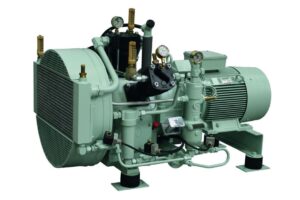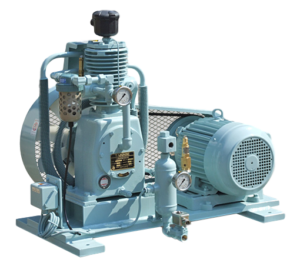Air Compressors are one of the critical components in the ship's machinery, quietly powering and helping operate many machines and subsystems found on ships. In this post we will try to delve into the indispensable role of air compressors in ships, shedding light on their diverse applications, types, and the indispensable contribution they make to the reliability and functionality of maritime endeavors.
Principle of Operation
Air Compressors produce pressurized air by decreasing the volume of air and in retrospect increasing its pressure. According to the basic thermodynamics principles and the Boyle - Marriot gas equation, with a steady temperature, when an increase in gaseous pressure takes place, its volume reduces.
The air compressor works on the same principle on which it produces compressed air, by reducing the volume of air under pressure. In retrospect this air volume reduction results in an increase in air pressure without any temperature difference.
So we can say in general terms that an air compressor is a mechanical appliance in which electrical or mechanical energy is transformed into dynamic energy in the form of air under pressure.
We mentioned already that there are different types in use according to the specific usage. Let's have an overview of these types.
Types of Air Compressors
Air compressors on ships can be classified into two main types regarding the pressures produced:
Main Air Compressors: High-pressure compressors with a minimum pressure value of 30 bars. They are used in the operations of the main ship engines, mainly to start the main or secondary engines.
Service Air Compressors: Low-pressure compressors that provide pressure of up to 7 bars. They are used in service and control airlines, deck use, cleaning, etc.
Air Compressor Categories Regarding Design and Working Principles
Regarding the compressor's design and operating principle, we have the following four types of compressors:
- Centrifugal compressors. They operate by using a rotating impeller thus increasing the velocity of the air and converting this kinetic energy into mechanical by slowing the air down in a diffuser. In the shipping industry, they can be used for starting and stopping the main engine and controlling pneumatic systems. Centrifugal compressors are renowned for their energy efficiency. As a result on ships, where fuel efficiency is a critical factor they contribute to the overall saving of energy. Regular maintenance with the necessary quality spares is crucial to ensure reliable performance for this kind of compressor.
- Rotary vane compressor. These compressors operate by using trapped air between the rotating vanes they are equipped with. In that way, the volume of the trapped air is reduced thus increasing its pressure according to the Boyle – Marriot law.
- Rotary screw compressor. These compressors utilize a rotary mechanism with vanes that sweep along the inner surface of a cylindrical chamber, compressing air as it moves. The compact design and relatively low maintenance requirements make rotary vane compressors ideal for many maritime applications. They are commonly employed for tasks such as operating pneumatic tools, supplying air for control systems, and supporting various pneumatic-driven machinery aboard the vessel.
- Reciprocating air compressor. Widely used in all kinds of vessels, these kinds of compressors operate by using pistons to compress air. This air is then stored inside air tanks for various applications. Common uses include the pressured air needed for starting the ship's main engine, air for ventilation systems, and controlling pneumatic systems for cargo handling.


Maintenance and Care
Air compressor maintenance procedures onboard ship are crucial for the smooth operation of these systems. Even more important is following the rules and maintenance intervals specified by the manufacturer.
Here we point out an overview of some basic maintenance tasks:
Regular Inspections: Conduct routine visual inspections of the compressor and associated components to identify any signs of wear, leaks, or damage. Pay attention to belts, hoses, fittings, and seals. Also, pay attention to regular running temperature and pressure readings.
Oil Checks and Changes: Monitor oil levels regularly and adhere to the manufacturer's guidelines for oil changes. Clean or replace oil filters as recommended by the manufacturer.
Air Intake Filters: Clean or replace air intake filters as needed to prevent dust and debris from entering the compressor and causing damage.
Tighten Connections: Inspect and tighten connections, bolts, and fasteners to prevent air leaks and ensure the compressor operates efficiently.
Lubrication: Ensure proper lubrication of moving parts according to manufacturer recommendations to reduce friction and extend the lifespan of the compressor.
Regular maintenance is essential to extend the lifespan of compressors and maintain the safety and efficiency of these systems. BY implementing these procedures and adhering to manufacturer guidelines, ship operators can minimize downtime and prevent costly repairs.
Let us also not forget the importance of training the crew members on proper operation activities and daily manual inspections.
Should you need more information about the different types of Air Compressors on ships, you can contact Oceantech at:
Email: oceantech@ost.gr
Tel: +30 2130337678
To view air compressors types and spare parts that we cater click here.

